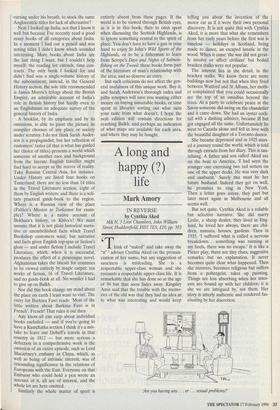A long and happy (?) life
Mark Amory
IN REVERSE by Cynthia Aked M& N, 3 Lion Chambers, John William Street, Huddersfield, HD1 lES, £10, pp. 303 'Think of "naked" and take away the "n" ' advises Cynthia Aked on the pronun- ciation of her name, but any suggestion of sauciness is misleading. She is a respectable upper-class woman and she recounts a respectable upper-class life. It is remarkable that she has done so at the age of 94 but that soon fades away. Kingsley Amis said that the trouble with the memo- ries of the old was that they had no idea as to what was interesting and would keep telling you about the invention of the motor car as if it were their own personal discovery. It is not quite this with Cynthia Aked, it is more that what she remembers from her early years before the first war is timeless — holidays in Scotland, being made to dance, an escaped lunatic in the wood. When it came 'the war did not great- ly involve or affect civilians' but boiled bracken stalks were not popular.
The interest lies in the detail, in the bracken stalks. We know there are more buildings now but not that when they lived between Watford and St Albans, her moth- er complained that you could occasionally see the top of an omnibus beyond the trees. At a party to celebrate peace at the Savoy someone did swing on the chandelier and it came down. She had an oyster cock- tail with a dashing admirer, became ill but got engaged all the same. Unfortunately he went to Canada alone and fell in love with the beautiful daughter of a Toronto doctor.
She became depressed and in 1925 start- ed a journey round the world, which is told through extracts from her diary. This is tan- talising. A father and son called Aked are on the boat to America, 'I had seen the younger one exercising two red setters on one of the upper decks. He was very dark and sunburnt.' Surely this must be her future husband. Indeed they get on well, he promises to ring in New York. Then a letter goes astray, they part but later meet again in Melbourne and all seems well.
But not quite. Cynthia Aked is a reliable but selective narrator. She did marry Leslie, a sheep dealer, they lived in Eng- land, he loved her always, there are chil- dren, nannies, houses, gardens. Then in 1935, 'I suffered what is called a nervous breakdown. . . something was running at my heels, there was no escape.' It is like a Pinter play, there are tiny clues, suggestive remarks, but no explanation. It never becomes quite clear what happened. Then she recovers, becomes religious but suffers from a poltergeist, takes up painting. Things are less absorbing when her inter- ests are bound up with her children; it is she we are intrigued by, not them. Her story is utterly authentic and rendered fas- cinating by her discretion.
'Are you having any. . . er. . . . sexual problems?'


























































 Previous page
Previous page